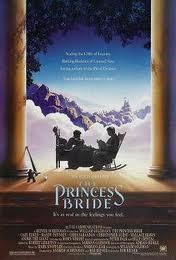My Characters Don’t Give a Damn
 And why should they? Most of them don’t live in universes where damnation is a possibility. What? You didn’t think that swearing, cursing, or slang had just as much to do with world-building as how your characters speak in general?
And why should they? Most of them don’t live in universes where damnation is a possibility. What? You didn’t think that swearing, cursing, or slang had just as much to do with world-building as how your characters speak in general?
Does everyone know the bi-lingual pun that’s in The Princess Bride? It’s the part in the film where they’re rounding up everyone in the Thieves’ Forest and the guard says to Iñigo, “Ho there!” and Iñigo replies, “Get away with your ‘HO there.'” Now, if you know that the f-word in Spanish is “joder,” pronounced HOthere, this is a pretty funny bit. If you don’t… well, you do now.
Aside from the comedy potential, William Goldman (who wrote both the novel and the screenplay) is underscoring the point that Iñigo is Spanish – which in itself underscores that The Princess Bride is set in a recognizable version of the primary world.
For our purposes, Iñigo’s example illustrates one of the prime sources for swear words: sexual acts. Anyone who pays attention is familiar with the other sources: religion, family relations, body parts, and bodily functions. Yes, sexual acts are bodily functions, at least in part. But eating, for example, doesn’t usually give rise to swear words – unless there’s something taboo involved, which gives you another clue as to the origin of a lot of profanity.
Take a moment to consider the origin of the word profanity (just in case you think religion is no big deal).
How your characters swear, what they swear on, and who/what they swear by can be important indicators of their cultures – and therefore important aspects of world building. On the one hand, we don’t want to make our invented worlds seem too much like the primary world by the wholesale use of our own culture’s swear words. On the other hand, we don’t want to make our inventiveness so… well… inventive, that every time our characters swear the readers get pushed out of the narrative while they try to figure out what we really “meant.”
This is such a tricky issue that most writers try to avoid inventing new swear words. “Glarnick,” bellowed Posto when he dropped the hammer on his foot. Hmm. I can see why.
Aside: there seems to be a clear consensus that the word “frak” is one of the few invented swear words that actually work. I suggest that the reason is pretty obvious.
Martha Wells is one who, along with authors like Alex Bledsoe and Doug Hulick, tries not to invent swear words. She does do something rather interesting in her Fall of Ile-Rien Trilogy, however, that I’d like to call “repurposing.” There’s a matriarchal society in that particular work, and that fact gives the term “motherless” a significance it wouldn’t have in our own culture. It’s an excellent example of how a word that invokes a degree of sympathy in our culture can be repurposed into a negative term.
Something else happens as well, if I can go all PhD-in-literature on you for a second. The reader’s (perhaps unconscious) awareness of the real world connotation of “motherless” adds a depth and resonance to the term that doesn’t exist without both worlds being in the mix.
Isn’t that cool? I frakin’ love this stuff.
 Wells also does something which is possibly even more interesting in her Books of the Raksura, where the Raksura themselves use only scatological profanity. You see? Profanity becomes, in this case, a way to identify a whole race of people.
Wells also does something which is possibly even more interesting in her Books of the Raksura, where the Raksura themselves use only scatological profanity. You see? Profanity becomes, in this case, a way to identify a whole race of people.
This gives us a good model for swearing in Fantasy or SF. Different cultures, even different professions, have their own ways to swear. Deity/religious-based swearing can only be used by cultures which have a deity/religion – or which revere that religion in a particular way. Religious-based swearing in English, for example, is pretty much confined to the “damn,” OMG level. You have to come from a Roman Catholic culture to swear on/by the Host.
Even then, as Alex Bledsoe points out, inflection plays a very important part of the swearing effect. Obviously the word “Host” (not the same word as “host,” by the way) is not profanity when used by RC priests in the course of their duties. But when it’s shouted by a person who’s just dropped a hammer on her foot, it is. And when that same person sees something shockingly beautiful and says “Host,” in an awestruck tone – well, is it still profanity? I’ll let you decide.
I haven’t exhausted this topic by any means. I can already tell that this is something I’ll be coming back to again and again – why I haven’t even touched on what using scatological profanity tells us about a given culture.
Then there’s body language. Think about it. If there’s no heaven, or at least no “gods” “up there”, who are you rolling your eyes toward? So we’ll be revisiting this topic over the next little while.
Though I do want to mention that there is a very practical reason to use either invented or repurposed terms as swear words. There are no “f-bombs” to worry parents, teachers or librarians. Most young people who read fantasy don’t confine themselves to stuff clearly labelled “YA”, at least not in my experience.
By the way, the “Ho there” pun doesn’t work if you watch the film dubbed in Spanish. Lo siento.
Violette Malan is the author of the Dhulyn and Parno series of sword and sorcery adventures, as well as the Mirror Lands series of primary world fantasies. As VM Escalada, she writes the soon-to-be released Halls of Law series. Visit her website www.violettemalan.com.
Terrific observations Violette. I’ve enjoyed reading your additions here on the BG website.
The original Battlestar Galactica gives examples of how to do it well (“Frak”, as mentioned above) and poorly (“Felgercarb”).
Thanks Jason, I’m glad you’re enjoying them.
Joe, I’m thinking about the “gorram” in Firefly as well, as an example that seemed to work intermittently. On the one hand, it avoided possible bleeping of the word “god”, but on the other it did ocassionally make me go “huh?”
In a way, this also circles back to the discussion about subtitles in one of the earlier language posts — I watch a lot of Hong Kong crime/action movies, and the subtitles tend to translate everything into a fairly standard American curse-word vernacular. I wonder if the subtitles are reflecting the actual Cantonese dialogue or if they’re more concerned with translating the affect of what the characters are saying rather than the specific terms.
Well ain’t this taffing rich.
Jeff: hahahaha. Another example of, I think, one that works.
Joe: I’ll occasionally watch a film in a language I can follow with the English subtitles on, just to see what changes there might be. Sometimes they miss whole connotations by translating literally instead of figuratively.
The movies I watch are, I think, mostly subtitled by native Cantonese speakers (as opposed to native English speakers), which can lead to interesting results.
It’s fun when occasionally the characters will switch into spoken English for a brief exchange, and the subtitles and the spoken words will really not be all that close to each other.
Gorram worked okay for me, but the first time I watched Firefly, I had moments of thinking I was losing my hearing, because the characters went on for two or three exchanges and I couldn’t make sense of a single syllable. It took me an embarrassingly long time to realize that the characters were speaking Chinese.